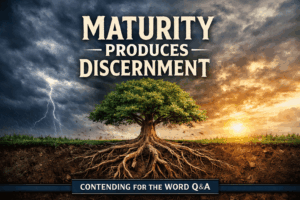⏱️ Estimated Reading Time: 4 min read
In John 9:1-41, we read of Jesus’ interaction with a blind man at the pool of Siloam. Jesus frequently interacts with the blind or with people with various infirmities and disabilities. Because of that, His encounter with this blind man is not altogether unusual for Jesus. What is unusual is that this man’s parents are called to discuss his disability. In this passage, Jesus spits into the dirt at His feet, mixing it to make mud. He puts this mud onto the eyes of the blind man and tells him to “‘Go to Siloam and wash’” (John 9:11). The man obeys, and he receives his sight.
This man was blind from birth, so I cannot imagine what it must have been like to see the world for the first time: all of the things you had only been able to touch and hear for so many years, now bursting with color and life! It would probably be pretty overwhelming. The formerly blind man begins to tell the people around him of his miraculous healing, which leads to scrutiny. The Pharisees are called in since this miracle occurred on the Sabbath. Both the townspeople and the Pharisees ask the man over and over what had happened, how he had gained his sight. The man explains repeatedly, “‘He put mud on my eyes, and I washed, and I see’” (John 9:15).
Despite his insistence that he is the man who was born blind and can now see, the people call in his parents to testify to this. His parents back up his story, identifying him as their son. They do not know how he has been healed, and they tell the crowd, “‘Ask him; he is of age. He will speak for himself’” (John 9:21). At first glance, this looks like they’re advocating for their child. He can speak, and he should talk to tell his side of the story. The crowd should not be asking his parents to explain what happened like he isn’t there or isn’t capable. But, John continues, “(His parents said these things because they feared the Jews, for the Jews had already agreed that if anyone should confess Jesus to be Christ, he was to be put out of the synagogue” (John 9:22).
Fear drove this man’s parents to leave him to explain the miracle he’d just experienced. Instead of rejoicing with him, they allowed fear of the political and religious climate of the day to rule their hearts. The man, however, did not allow fear to reign over him – no, he had just been given a huge gift by the Lord of all, and he was going to keep shouting about it for everyone to hear. That should be our response when the Lord does something amazing, too. All too often, we allow our fear of what others will think to stop us from declaring the glory and majesty of God. As we go forth, may we live in the gratitude and joy of the blind man who was healed. May we also advocate for the voices of others, especially those living with a disability, to be heard.
Oftentimes, their voices can be overshadowed by louder voices, but everyone should be allowed to speak for themselves. Let’s create spaces where people feel comfortable enough to do so today. We can do this by listening to others well – by not talking over them, but instead sitting and hearing what they have to say. If someone is being talked over or ignored, we can ask them directly what their opinion on the matter is (this works especially well in a group setting). And, finally, we can create comfortable spaces by simply being kind, whether we agree with what someone has said or not. Kindness is key to driving out fear of judgment.



